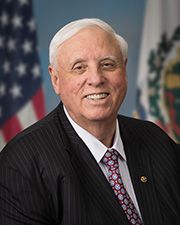US Senator
James Justice
Biography
Senator James C. Justice II is a member of the United States Senate representing West Virginia. Born on April 27, 1951, in Charleston, West Virginia, he graduated from Woodrow Wilson High School in Beckley before earning a Bachelor's degree and an MBA from Marshall University in 1974 and 1976, respectively. Prior to his election to the Senate, Justice had a notable career as a businessman in the agriculture and coal mining sectors, founding and serving as the CEO of his own company. Additionally, he served as the Governor of West Virginia from 2017 to 2025, pursuing various initiatives aimed at improving the state's economy and infrastructure.
Justice is associated with several Senate committees, including the Agriculture, Nutrition, and Forestry Committee, and its subcommittees focused on issues relevant to conservation, food safety, and rural development. His involvement in these committees reflects a commitment to agricultural policy and rural communities which are vital to West Virginia's economy.
During his time in office, Justice has sponsored and co-sponsored several bills that highlight his political priorities. Notable bills include the Protection of Women and Girls in Sports Act of 2025 (SB9), which aims to uphold sex-based distinctions in athletic competitions in alignment with Title IX, a move aimed at reinforcing female athletes' rights. This bill faced significant debate, viewed both as a defense of traditional athletic categories and as potentially discriminatory against transgender athletes.
Another significant piece of legislation co-sponsored by Justice is the Prohibiting Foreign Adversary Interference in Cryptocurrency Markets Act (SB1223), a measure aimed at enhancing national security by preventing foreign adversaries from engaging in U.S. cryptocurrency markets, a reflection of his focus on economic security and innovation in modern finance.
Justice's support for environmental regulations is illustrated through his cosponsorship of a series of joint resolutions aimed at expressing disapproval of certain Environmental Protection Agency (EPA) rules, including those impacting California's vehicle emissions standards. Bills such as SJR45 and SJR47 signify a commitment to easing federal regulations, with proponents arguing these changes could benefit the automotive industry while opponents warn of potential environmental repercussions.
In broader terms, Justice's legislative efforts showcase a commitment to GOP priorities such as deregulation, support for traditional family values, and a focus on economic development for rural constituents. His sponsorship of the Dignity for Aborted Children Act (SB242), which mandates requirements for the disposal of human fetal tissue, aligns with a conservative approach to reproductive policies, emphasizing a moral stance on life issues.
Overall, Justice's political leanings manifest through his staunch support for legislation that reflects traditional conservative values, a focus on economic growth, and a commitment to representing rural interests within West Virginia. As he continues his role in the Senate, his legislative agenda will likely prioritize similar themes, aiming to bolster the state's economy while navigating complex social issues that affect his constituents.
Senator Justice is married, and the personal aspects of his life, including his family, contribute to his understanding of the challenges faced by the families in his constituency. His business background complements his political endeavors, with experience that informs his legislative priorities aimed at fostering economic growth and stability for West Virginia.
